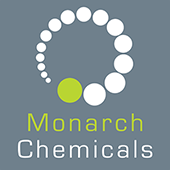Acetic acid, also referred to as ethanoic acid or methanecarboxylic acid, is a colourless liquid with distinct sour taste and pungent odour. It is a simple carboxylic acid (an organic compound that has a carboxyl group (-COOH) characterised by its acidity, polarity, and high boiling point), and, at 100% pure concentration, is known as glacial acetic acid.
This article takes a look at what acetic is, how its produced and its many uses in everyday life.
What is acetic acid?

29 Mar 2023
A versatile chemical compound with a range of uses across multiple industries, this article takes a look at acetic acid, what it is and its uses in everyday life.
How is acetic acid produced?
Acetic acid is produced through a chemical reaction called methanol carbonylation, which involves the reaction of methanol and carbon monoxide in the presence of a catalyst such as rhodium. This reaction creates acetic acid and various by-products which are separated and purified through distillation processes.
Is acetic acid naturally occurring?
Yes, acetic acid is naturally occurring and can be found in a variety of sources. It is a natural metabolite and produced by the human body to help break down fats and carbohydrates. It is also present in small amounts in fruits and vegetables contributing to their sour taste.
Is acetic acid the same as vinegar?
Acetic acid is a key component of vinegar, but vinegar is not pure acetic acid. Vinegar is a solution of acetic acid, water, flavourings, and trace amounts of other acids. In fact, the product only contains around 4 – 20% acetic with the level of dilution being indicative of the strength (referred to as grain strength).
What are the uses of acetic acid?
Acetic acid has a wide range of applications within various industries from pharmaceutical, chemical and cleaning products to agriculture, food and drink.
Cleaning Products
Acetic acid is a powerful cleaning agent, effective at removing a broad spectrum of soils as well as offering excellent antibacterial activity against a wide range of microorganisms. Given its acidic properties it is also found in a number of glass cleaners and bathroom cleaners to remove hard water deposits and streaks.
Agriculture and Horticulture
Acetic acid is used as an alternative to traditional, harsh contact herbicides. When applied to weeds and foliage acetic acid ruptures the cell membranes, causing the leaves to dry out and die. As a weak acid it is also used as a pH adjuster when soil is too alkaline and, as the above paragraph outlines, can be used as a cleaning agent to disinfect and clean animal housing and equipment.
Pharmaceuticals
Acetic acid is a common ingredient in pharmaceutical products and preparations, for example, acetic acid ear sprays which treat outer ear infections as well as help soften wax. Acetic acid is also used in the manufacture of aspirin and as a preservative in other medications.
Textiles
In the textiles industry acetic acid is used for multiple purposes including as an acidifying agent in the dyeing process, as a fixing agent in textile printing and as a finishing agent to help remove any alkaline residues in material.
Photography
In photography acetic acid is used as a fixing agent to help prevent images from fading.
Adhesives and Paints
Vinyl acetate monomer (or VAM for short) is one of the primary products that uses acetic acid in its production. VAM is made by mixing acetic acid with oxygen and ethylene gas at high temperature with the help of a catalyst (palladium in this instance). It is then purified and used as a building block in the manufacture of adhesives, paints and synthetic rubber.
What is acetic acid used for in food?
Food grade acetic acid, commonly referred to as food additive E260, is a highly versatile and useful component in the food and drink industry being a key ingredient in the production of fermented food and drinks such as vinegar, kombucha and Lambic beer. It also possesses excellent food preservation properties helping to inhibit the growth of bacteria.
Other uses of acetic acid in food include as a pH adjuster to increase the acidity of certain drinks and as a flavour enhancer where it imparts a sharp, sour taste.
Is acetic acid dangerous?
According to Public Health England low level exposure to acetic acid from your diet or the use of household products would not be expected to cause any adverse health effects however more concentrated solutions of acetic acid (>25%) can cause corrosive damage.

Vapour with high levels of acetic acid can cause eye, nose and throat irritation, cough, headache, fever and confusion. Ingestion can cause immediate burning of the mouth and throat and skin contact can cause pain, burns and ulcers.
As with all chemicals obtain a copy of the latest SDS for the concentration you are using and always handle these products with care and ensure appropriate PPE is worn.
Looking for an acetic acid supplier in the UK?
Monarch Chemicals are a leading UK bulk distributor and supplier of acetic acid, offering the solution in various concentrations and pack sizes from small packs to bulk road tankers, . For more information and to discuss your requirements please visit our acetic acid product page.
Related Articles
 |
|



